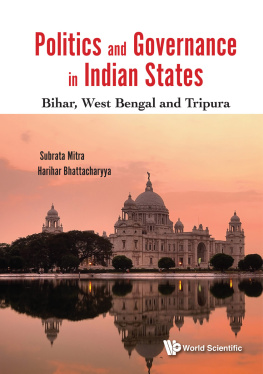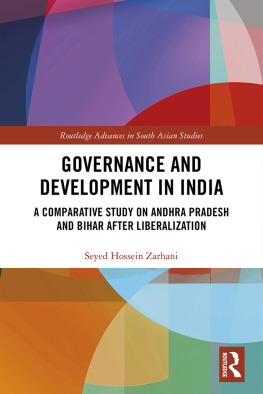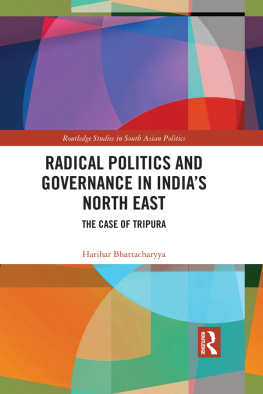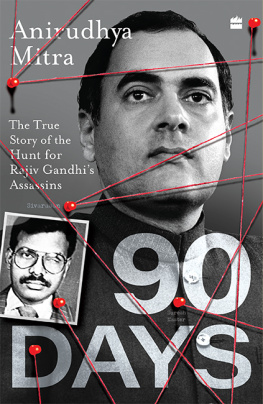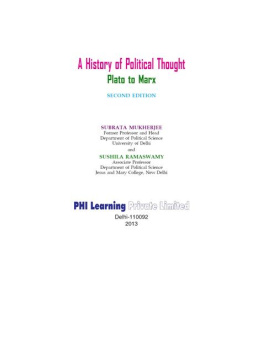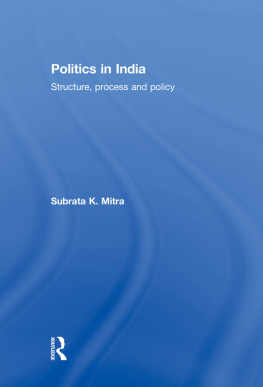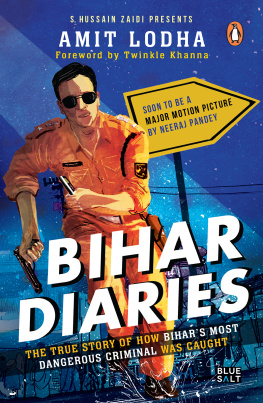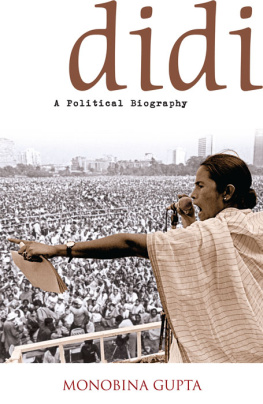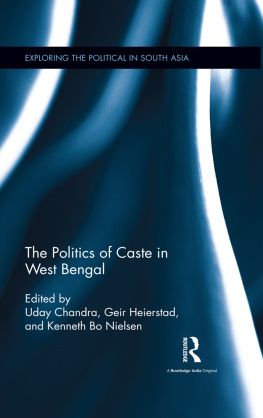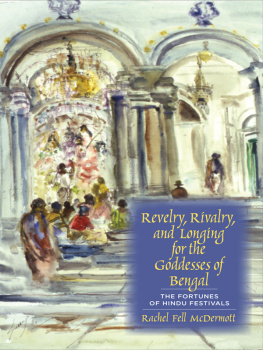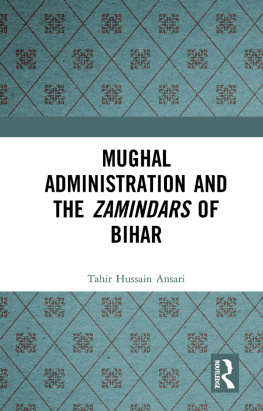Politics and Governance in Indian States
Bihar, West Bengal and Tripura
Politics and Governance in Indian States
Bihar, West Bengal and Tripura
Subrata Mitra
Institute of South Asian Studies (ISAS)
National University of Singapore, Singapore
Harihar Bhattacharyya
Department of Political Science
University of Burdwan, West Bengal, India
Published by
World Scientific Publishing Co. Pte. Ltd.
5 Toh Tuck Link, Singapore 596224
USA office: 27 Warren Street, Suite 401-402, Hackensack, NJ 07601
UK office: 57 Shelton Street, Covent Garden, London WC2H 9HE
British Library Cataloguing-in-Publication Data
A catalogue record for this book is available from the British Library.
POLITICS AND GOVERNANCE IN INDIAN STATES
Bihar, West Bengal and Tripura
Copyright 2018 by World Scientific Publishing Co. Pte. Ltd.
All rights reserved. This book, or parts thereof, may not be reproduced in any form or by any means, electronic or mechanical, including photocopying, recording or any information storage and retrieval system now known or to be invented, without written permission from the publisher.
For photocopying of material in this volume, please pay a copying fee through the Copyright Clearance Center, Inc., 222 Rosewood Drive, Danvers, MA 01923, USA. In this case permission to photocopy is not required from the publisher.
ISBN 978-981-3208-22-3
For any available supplementary material, please visit http://www.worldscientific.com/worldscibooks/10.1142/10396#t=suppl
Desk Editor: Shreya Gopi
Typeset by Stallion Press
Email:
Printed in Singapore
Foreword
This book is the outcome of painstaking research and sifting through reams of records. This publication was conceptualized as a result of Subrata Mitra and Harihar Bhattacharryyas fertile imagination and deep-rooted interest in comparative politics. I had initially pondered over the wisdom in choosing these three States. However, as I read through the chapters the raison dtre of the choice appealed to me. The States narrate three very different stories all three have maintained their initial territorial and political integrity and yet have had very different political and economic experiences. This book is an excellent analysis and authoritative chronicling of their experiences and the lessons emerging therefrom.
The Indian people have solemnly resolved to constitute themselves into a sovereign socialist democratic republic comprising a Union of States. In the parliamentary form of democracy that India practices, the States elect their own legislative assembly members as well as the representatives to the Parliament of the country. The governance of the State is entrusted to the council of ministers who would be from the political party or coalition with the majority legislators. Thus barring issues such as Defence and External Affairs, most of the other governance functions within the State are conducted by the State government. Indian federalism defines the responsibilities and powers of the regional governments with the model of governance at the State level mirroring that of the Union level. Whilst the Legislative Assembly and its elected members are the law makers, the government and administration is run by a permanent bureaucracy supervised by a council of ministers. Thus the capability to administer and provide a good government is the sole responsibility of the State government.
From its birth, the Indian federal structure has faced many challenges. There have been demands for formation of new States. The country witnessed a single political party dominating at the Centre and the regions in the initial 20 years after independence. This was a very supportive factor in the working of Indian federalism in its formative stages. A single party at the Centre and States had an abiding impact on political, financial and development relations between the Centre and the States, since inter-governmental tensions were kept under control and co-operation was promoted.
However, with the general election in 1967, the dominance of a single party was broken and regional parties emerged and came in to control of the administration of different States. It is in this background that the work of the authors needs to be assessed. The choice of States, seemingly insignificant at first glance, is very illustrative of the disparate relationship between the three States and the Centre and the model and content of governance that prevailed within. In the context of regional governance beginning to gain prominence and also slowly but very definitively commencing to assert itself, a new chapter unfolded in the history of postindependence India. The three States chosen for study display very diverse characteristics. Bihar, at one time among the best administered States of India, constitutes the Hindi heartland. Though a one-time well-administered State, it soon displayed very significant weaknesses in administration, its development index, and law and order. It soon found its place as a part of what was pejoratively referred to as the BIMARU (meaning sick) States, as it was displaying very poor levels of GSDP growth (BIMARU for Bihar, Madhya Pradesh (undivided), Rajasthan and Uttar Pradesh (undivided) this grouping has lost its relevance now). Bihar has had a very tumultuous political history after the turn of the millennium. However, the authors have very accurately come to the finding, after monitoring the progress along significant parameters such as literacy, poverty levels, consumption expenditure, social service indicators and incidence of murders or riots (as an indicator of maintenance of law and order), that with Nitish Kumar coming to power in 2005, Bihar is getting its due place in the nation! Bihar presents itself as a compelling candidate for a study in comparative politics where competent political leadership has brought rich dividends on all fronts.
West Bengal, on the other hand, the land of Rabindranath Tagore, literature and culture, soon passed into communist bastions for 34 years. It is remarkable that in this period, the State saw only two chief Ministers viz Jyoti Basu (19772000 he resigned in Nov 2000 on health grounds) and Buddhadeb Bhattacharya. The CPM was defeated by the Trinamool Congress of Mamata Banerjee in the 2011 State elections. The transition away from the clutches of the communists in 2011 at the hands of a frail, strong willed and iron fisted lady, was again fairly tumultuous. The new government had inherited a treasury where the debt servicing of Rs 232 billion (3.6 billion USD) was only marginally lower than the States own tax revenue of Rs 249 billion (3.9 million USD) and where revenue expenditure was more than revenue receipt (as was presented in the budget of 201213). The State has been making concerted efforts to improve its overall social indicators. It has improved the school dropout rate and has seen a decline in child marriages.
This State has been a classic study of regional governments increasing their share of dominance over the central government. The Teesta water treaty with Bangladesh was derailed by the constant opposition of Mamata Banerjee who felt that India signing the treaty would be detrimental to the irrigation requirements of West Bengal. The Chief Minister has maintained her stand and also ensured that the central government does not conclude the water sharing pact with Bangladesh though her own technical advisors maintain that in line with international convention, the free flow of Teesta water cannot be blocked. Nevertheless, this has not cut much ice with the States political viewpoint which inevitably is always the personal view of the Chief Minister. This is an illustration of a State gaining in importance and prevailing over the central government, on issues which are largely in the central governments mandate.




